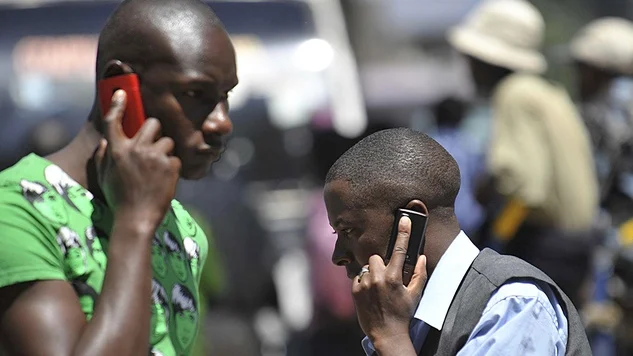By Conrad Onyango
African telcos are racing to construct green-powered data centres as the continent’s appetite for digital services grows, fuelled by the world’s largest youth population.
Already the continent is a pioneer and outperformer in mobile money, headlined by Kenya’s M-Pesa and other mobile payment services, with 60% of the population accessing the internet via mobile.
By 2025, 167 million more people from Sub-Saharan Africa are projected to be subscribed to mobile services, reaching 623 million users, and smartphone connections in the region are also seen more than doubling.
According to the International Finance Corporation (IFC), Africa’s Internet economy has the potential to reach 5.2% of the continent’s gross domestic product (GDP) by 2025, contributing nearly US $180 billion to its economy.
Major telcos on the continent are responding to this demand opportunity—supported by moves to take education, health care, agriculture services and governance online—by lining up data centre projects they say will be among the largest and greenest on the continent.
In its 2024 sustainability report, Kenya’s giant telco, Safaricom, has outlined plans to construct three Tier 3+ scale data centres as part of its long-term strategy to transform from a telecommunications company to Africa’s leading purpose-led technology company by 2030.
The company’s Limuru Data Centers Phase 1 is already operational, with Phase 2 planned to come on stream by 2025.
“The facility is designed for future growth, with the potential to support 1,000 high density racks and an IT load of up to 20 MW within the next decade,” said Safaricom in the report.
The strategic location of the data centre in the cooler Limuru region, the telco said, will enable it to deliver a Power Utilisation Effectiveness of 1.35, making it one of the most energy-efficient facilities in Africa.
“The facility is equipped with a 200 kWp rooftop solar PV plant, with plans to scale up to 2MWp. Additionally, we are exploring partnerships with renewable energy producers to further enhance our commitment to sustainability,” according to the sustainability report.
In June, MTN Nigeria announced it was building a 1,500-rack Tier 4 data centre to play a pivotal role in meeting the growing data demands and digital needs of businesses and consumers in the country.
In a LinkedIn post, MTN Nigeria CEO, Karl Olutokun Toriola, said the facility would be the largest in West Africa upon completion and would enable the telco to respond swiftly to market demands and support businesses in Nigeria.
“Ultimately, this center will play a vital role in supporting Nigerian businesses to collaborate through cloud services, expand their capabilities, and thrive,” wrote Toriola.
”Our commitment to Environmental, Social, and Governance (ESG) principles is reflected in the data center’s eco-friendly design to utilize efficient cooling systems and a combination of traditional energy sources, gas, and renewable energy,” he added.
After launching a multi-million data centre business, Nxtra by Airtel, in December 2023, the telco broke ground in March to what it termed as one of Africa’s largest data centres in Lagos, Nigeria, with plans for more across the continent.
“Through this business, we aim to create one of the largest networks of data centres in Africa with high-capacity facilities in major cities complementing our existing sites. We’re taking great care to incorporate modern energy efficiencies into our operations,” said Airtel Africa’s Sustainability Report 2024.
Africa Data Centers Association also affirms the expansion of industry due to the increasing demand for such facilities throughout the continent, citing Kenya, Morocco and South Africa as fast-growing markets- albeit with a huge infrastructure gap to fill in.
“Africa needs up to 1000 MW and 700 facilities to meet demand and bring capacity density on a par with that of South Africa, the region’s leader,” according to Data Centers in Africa focus report 2024.
Africa, the report shows, accounted for less than 2% of global colocation Data centre supply, with over half that total located in South Africa.
“The development of data centres is picking up pace due to strong demand from economic operators, as well as increasing awareness that African countries must establish their digital sovereignty in an increasingly competitive and complex world,” said Ayotunde Coker, Chairman, Africa Data Centres Association.
Nigeria is listed in the data centre focus report as Africa’s largest digital economy, with the Internet contributing US$36.5 billion to its GDP, followed by South Africa (US$31.5 billion) and Egypt (US$26 billion).
Other large digital economies include Morocco (US$21.1 billion), Kenya (US$12.8 billion) and Algeria (US$11.9 billion).
Allied Market Research projects that the global market for DC provision will reach US$517.2 billion by 2030, up from an estimated of US$187.4 billion in 2020.
bird story agency
African telecommunications companies are rapidly building green-powered data centers to meet the increasing demand for digital services driven by the continent's large youth population. Notably, Africa is already excelling in mobile money, with 60% of internet users accessing services via mobile devices. By 2025, an additional 167 million people in Sub-Saharan Africa are expected to subscribe to mobile services, boosting the number of smartphone connections significantly. The International Finance Corporation projects that Africa's internet economy could reach 5.2% of the continent's GDP, contributing $180 billion by 2025.
In response, major telcos are investing in large and sustainable data center projects. Safaricom in Kenya has announced its plans to build three Tier 3+ data centers as part of its strategy to transition into a leading technology company by 2030. Their existing Limuru Data Center showcases energy-efficient features with a solar PV plant and future growth potential. MTN Nigeria is constructing a 1,500-rack Tier 4 data center to support Nigerian businesses and is prioritizing eco-friendly designs. Similarly, Airtel has begun developing one of Africa’s largest data centers in Nigeria, aiming to expand further across the continent.
Despite the growth, Africa faces a significant infrastructure gap. The continent requires up to 1,000 MW and 700 additional data facilities to match South Africa's capacity. Currently, Africa's data center supply accounts for less than 2% globally, with the majority in South Africa. However, the demand for data centers is accelerating as countries seek to establish digital sovereignty amidst a competitive global environment. Nigeria, South Africa, and Egypt lead as Africa's largest digital economies, with significant contributions from the internet to their GDPs. The global data center market is projected to grow substantially by 2030.






